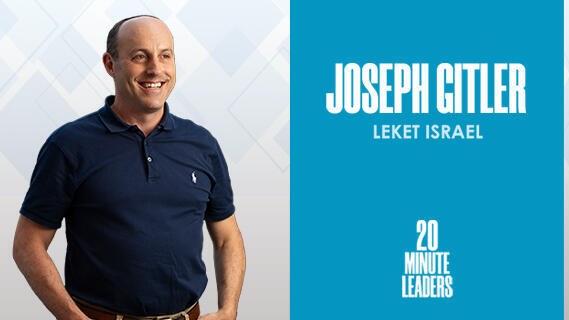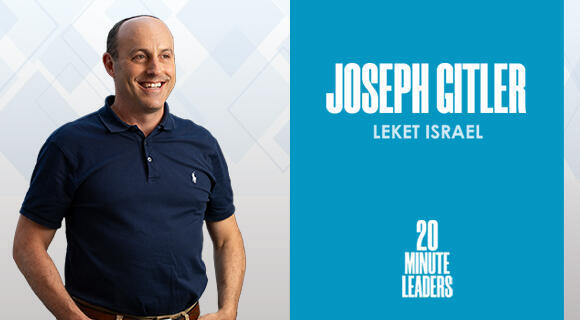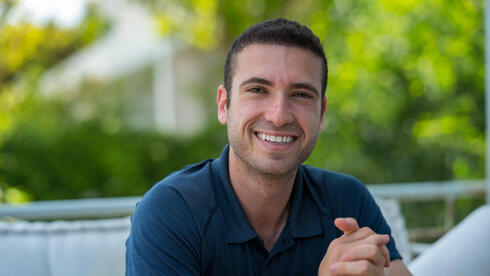
20-Minute Leaders
“A very painful way to live life is struggling to get basic necessities.”
As a newcomer to Israel in 1999, Joseph Gitler was struck by the abundance of food, food waste, and the people struggling to get basic necessities.
As a newcomer to Israel in 1999, Joseph Gitler was struck by the abundance of food, food waste, and the people struggling to get basic necessities. Though he saw prosperity in the startup world, he also saw there was a significant portion of the population being left behind. He founded Leket Israel, which acquires nutritious food that would go to waste and gets it to agencies who give it to those in need. Gitler shares that they collect extra prepared meals from places like restaurants and cafeterias as well as gleaning fruits and vegetables from farmers’ fields in the largest gleaning operation in the world. He explains that these crops make a huge difference in the nutrition and outlook of the families who receive them. Gitler says that some people look down on nonprofit workers, but he believes the sector is trying to solve the world’s hardest problems.
Click Here For More 20MinuteLeaders
Before we dive into Leket, tell me a little bit about yourself.
I grew up in New York till the age of 15. Then continued in Teaneck, New Jersey. Then I got married to my wife, Leelah. We lived in Riverdale, New York.
I was brought up with the ideal of moving to Israel; many modern Orthodox Jews in America are brought up that way, but very few actually take the plunge and move to Israel. We decided we wanted to go, and so we've been living here in Israel for the last 22 years very happily. We don't regret our decision.
Your passion for food, non-profit, impact, where does that stem from?
I have a passion for not wasting food. I'm not a foodie in that sense. I think for me, it was just coming to Israel with certain expectations. I came in '99. It was the height of the first tech boom in Israel. We can call ourselves a startup nation, and we have wonderful things going on here in the economy, but unfortunately with all that brilliance, we haven't figured out how not to leave behind 15 or 20% of the population who are struggling to make ends meet.
I just saw the land of milk and honey and the amount of food and the quality of the food. And on the other hand, the people struggling to make ends meet in a country that’s getting richer by the day. A very painful way to live life is always seeing what others have that you consider basic necessities and you are struggling to get those. My decision 19 years ago was to try to put those two together, make sure all this excess food wasn't going to waste and make sure it got to those people who were struggling.
Tell me about what you've observed about the ecosystem and the opportunity that you saw with Leket Israel, previously Table to Table.
If I think about the ecosystem we are in, I think about volunteerism, philanthropy, government support, government regulation, corporate support. The ecosystem is the third sector in Israel. Hundreds of thousands of Israelis live in this sector, even though it's a sector that sometimes gets a negative rap. Meaning, people who work in that sector do that because they couldn't work elsewhere, which is preposterous. There are people who've made it in the for-profit sector who then decide to bring their skills to the nonprofit sector. But there are also many talented people who make a decision to work in the third sector, which frankly is trying to solve the world's most difficult problems but with a lot of limitations, most importantly, limitations on how much they can get paid.
The other is about volunteerism. Leket has 30 to 40,000 volunteers every year helping us pick vegetables in the fields, helping us repack those fruits and vegetables for delivery to 250 agencies. The other one is that it is a beautiful sharing world; Leket is part of the international ecosystem of food banks. We learn from food banks throughout the world. Everyone shares their information very readily.
Tell me about Leket as an organization. What does the model consist of?
We are an umbrella organization looking for sources of healthy, nutritious food that would go to waste and distributing that to a network of non-profit organizations throughout Israel, both Jewish and non-Jewish. That's quite typical. The difference is what we do and how. Leket happens to focus only on healthy food. If I'm going to make a decision what to do with funds donated to Leket, I'm going to use it to provide healthy, nutritious food.
We therefore focus our energies on two areas. First, how we started, which was cooked meals. We worked very closely with corporate cafeterias, event halls, hotels, and the Israeli army to make sure that excess meals that maybe were in the buffet or, even better, were never served at all will be picked up primarily by our drivers and sometimes by volunteers. We would probably rescue and distribute, this year, about 2 to 2.2 million meals. This is food that would've gone in the garbage. Most of that food goes directly to agencies where it's eaten on the spot and it takes the pressure off of them from having to cook or raise the money to buy food.
Side B, which is much bigger and actually where our Hebrew name Leket comes from, is gleaning in the fields, ancient biblical precepts. That's the work we do with farmers. In Israel, we estimate 3 to 400,000 tons of fruits and vegetables go to waste. This year, we are going to do 30,000 tons, which is the largest gleaning operation anywhere in the world. The reasons can be market price, order cancellations. For example, Leket took in this year about 2,500 extra tons of potatoes and carrots that were destined for export to Russia. Acts of God, ugly fruits and vegetables, all these things come together to create mass waste. For Leket, getting high quality fruits and vegetables to the poor is a game changer for them, for their nutrition, and just for how they feel about themselves.
What does the logistics look like?
Essentially, Leket is a not-for-profit logistics company. We have the benefit of tens of thousands of volunteers. But of our 120 employees, probably 90 of them are involved in logistics. Leket, after 19 years of experience, has a good sense of what's going to come in, but not a perfect sense. That makes things complicated for the agencies that we serve, what can they expect from us. It also makes things complicated for our logistics. You can imagine when these 2,500 extra tons came in, that added hundreds of thousands of dollars to our expenses unexpectedly. It's a good problem to have.
Often in the nonprofit world, the biggest challenge is simply just resources. We don't have anyone who says, "Leket, your budget is $25 million. Here's $75 million. That will cover you for the next three years." It doesn't work that way in my world. We are scrappy, scraping by in the trenches every single day trying to raise the money from foundations, wealthy individuals, small donors, big donors, online campaigns, partnerships, corporate support.
How do you even deal with a situation like that where you have an opportunity?
We take great pride in trying to fundraise from people only once a year. Over the years, we've had enough money in the bank that when we wanted to take some chances, either we could or we could go to someone who we hadn't yet asked for money. However, in the last few years, first with Covid and now with Ukraine, we made a decision that we would go to our donor base a second time and say, "We have a unique opportunity." The last three years have been really unprecedented.
Let me give an example of what I mean from Covid. Leket, on March 10th, 2020, was collecting around 10,000 cooked meals a day. Within one month, hotels, corporate cafeterias, tourism, and restaurants were closed; there were no events: we were almost down to zero. We made a decision to go to our donors and say to them, "We don't buy food, but we are going to buy food now because our agencies need our help." We spent about eight million dollars in 2020 and 2021, buying meals from suppliers who normally give us food for free. That's not what Leket does, but desperate times call for desperate measures. I'm really hoping that 2023, things will just go back to normal.
Anyone watching this podcast who wants to come volunteer for Leket, check out our website, leket.org. Or joseph@leket.org.
Michael Matias, Forbes 30 Under 30, is a Venture Fellow at Innovation Endeavors as well as investment Venture Partner at Secret Chord and J-Ventures. He studies Artificial Intelligence and Human-Computer Interaction at Stanford University, and was an engineer at Hippo Insurance. Matias previously served as an officer in the 8200 unit. 20MinuteLeaders is a tech entrepreneurship interview series featuring one-on-one interviews with fascinating founders, innovators and thought leaders sharing their journeys and experiences.
Contributing editors: Michael Matias, Megan Ryan

